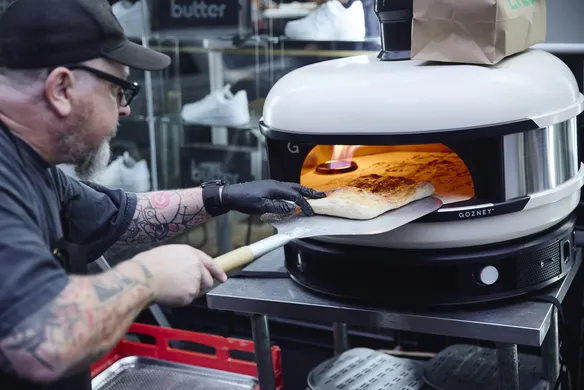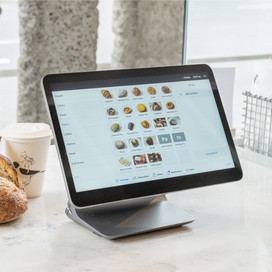Sydney’s hip-hop flavoured restaurant Butter has caught the attention of stars such as Wu-Tang Clan, Post Malone and A$AP Ferg. All of them have dropped in to sample the Surry Hills establishment’s unique combination of fried chicken and chilled champagne.
Butter and Square recently collaborated with a like-minded bunch of food and hospitality brands to explore sustainability and showcase what can be done with food that would otherwise go to waste.
Waste is a major problem in the food industry. It’s estimated to cost the Australian economy around $36.6 billion each year and means that 7.6 million tonnes of food goes wasted across the supply and consumption chain. That includes food that never leaves the farm, is lost during transport or is wasted in the hospitality sector and by households.
Food waste accounts for approximately 3% of Australia’s annual greenhouse gas emissions and, to produce all that uneaten food, we squander 2,600 gigalitres of water each year. That’s five Sydney Harbours going down the drain in the world’s driest inhabited continent.
Butter executive chef Julian Cincotta, in partnership with Square, came up with two evening events, called Future Histories of Hospitality, that would show what could be done with food diverted from landfill.
“We tried to come up with a new process, so we approached a few restaurants in our network, and a few people who have attended tonight, and we asked them if they had anything that they could spare or they don’t use, or something that would have gone to waste,” Julian said on the night.
With these surplus ingredients in hand, he devised a three-course menu for over 50 people. Nel restaurant supplied some spare cucumbers, kingfish, mushroom puree and macadamia nuts. Chin Chin uses only the largest lettuce leaves for its san choy bow and was happy to contribute cos hearts, which, Julian says, “is like the most amazing part of the lettuce, too”. Rising Sun Workshop donated abalone livers. All these diverse, delicate flavours were complemented by micro herbs that had been grown in just a week using an indoor growing system from Invertigro. The entire menu was served with breads baked in Gozmey pizza domes.
The guests enjoyed strawberry-and-watermelon spritzes made by one of the world’s most sustainable bars, Re, as wells as gin cocktails from Australia’s first officially carbon-neutral distillery, Four Pillars. Beers came from Young Henrys, which with University of Technology Sydney has pioneered a process for growing microalgae that not only consume CO2 (a by-product of brewing) but also can be turned into cattle feed to radically reduce methane output in livestock.
Koi Dessert Bar took a whole-of-product approach to cocoa beans to provide a delicious chocolate-based third course.
Julian spoke to us recently about what hospitality businesses can do to reduce their waste and begin their journey toward greater sustainability. One of those things, he said, was to share ideas with other businesses in your community.
“Talk to and share ideas with as many other businesses as you can, even in other industries. We have learnt lots from businesses who do something very different to ours!”
Describing the Future Histories of Hospitality events he says, “We were fortunate enough to get to run a series of dinners with Square where we brought together a range of people to talk about sustainability over dinner and drinks. It wasn’t a presentation or Q&A session but was more about bringing people together to openly talk about important issues.”
It’s a great example of expanding what the late American educator Stephen Covey called our circle of influence. Picture three rings. All of us have a circle of control close around us: these are the things we can immediately shape. For a business owner this includes their company, where they have the direct ability to initiate or improve sustainability measures. Surrounding us and our circle of control is our circle of concern, the big issues that we might feel we have no power over. When it comes to sustainability, this might include climate change, environmental destruction, food scarcity and, for some, animal welfare.
In between the circles of control and concern lies the circle of influence. This is where we discover that we have more power than perhaps we even thought. By being proactive and simply talking to people, we can pick up tips to both implement ourselves (within our circle of control) and inspire others to make positive changes (our circle of influence).
The guests at Butter’s events were asked a range of questions: What are the characteristics of a successful sustainable business? What are the challenges they’re faced with within their own businesses? What successes have they had along the way? What future actions might they take?
So many ideas were shared that night: from reducing packaging and plastics to pushing suppliers to do better, from constantly asking how things can be improved to bringing the customer along on the journey through an educational marketing campaign.
When it came to having a successful sustainable business, many there felt that it begins with having an open mind. Being adaptable, while acknowledging you’re not perfect, is the most important thing. Celebrate the small wins and make incremental progress; concentrate on making each day better than the one before.
One participant asked, “How can we create a system that disrupts the industry and creates a momentum of change?”
Food for thought, served one delicious waste-busting plate at a time.
This article is for informational purposes only and does not constitute professional advice. For specific advice applicable to your business, please contact a professional.
![]()











